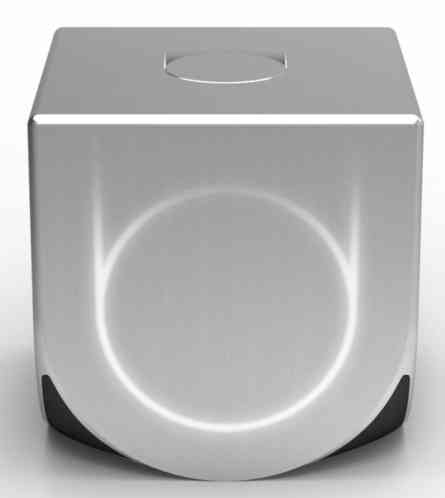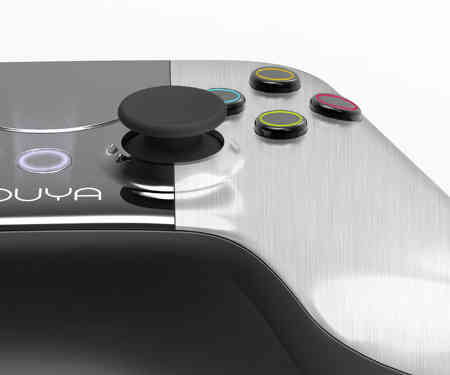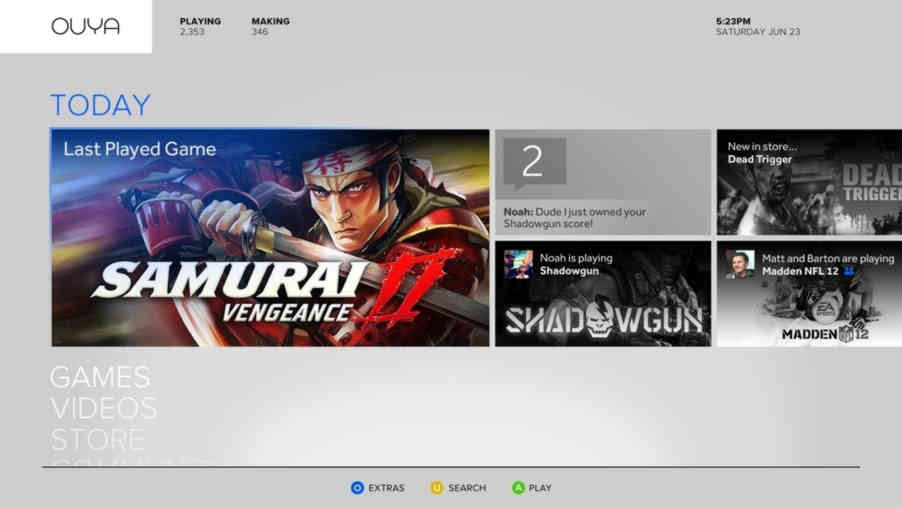| OUYA A $99 Open Games Platform Gets $1 million - For What? |
| Written by Ian Elliot |
| Wednesday, 11 July 2012 |
|
On the surface it all sounds like a really good idea. The OUYA games console is planned to be an open competitor to the likes of Xbox and PS3. It seems so good that it has been crowd funded to the tune of $1 million - but why exactly is it needed? A small firm based in LA has used Kickstarter to raise funds to launch an alternative platform to the established game consoles - the OUYA. It asked for $1 million and got it in record time. Currently the amount pledged stands at roughly $2,300,000. There must be a good reason - after all the wisdom of crowds is never wrong. If you have ever tried working with a closed environment like the PS/3 say, you will quickly discover that it's hard work, made harder by the restrictions on content, style and marketing. It would be good to have an open alternative that you could create games for in a free and easy way. What you need, clearly is cutting edge hardware. After all the graphics processing capabilities of machines like the PS/3 are legendary - if aging. There is progress to take into account, as well. It is estimated that mobile graphics chips should catch up with the likes of XBox in around 2014. Of course by then we will probably have the next generation of dedicated games machines to compare them against.
So what would you expect an open games console to be based on? The answer for this particular games console, the OUYA, is the same as for the recently announced Nexus 7 Android 4 tablet. It has an Nvidia Tegra 3 quad-core processor, with a 12-core NVida GPU with one 1GB RAM, 8GB flash storage and built-in Wi-Fi and Bluetooth. This tech spec could be described as "good enough" but not a match for a custom-designed games platform. This is not revolutionary hardware, but it will only cost $99. It can be this cheap because it doesn't come with a touch screen display or keyboard. Instead an HDMI connector uses a TV for display and a wireless games controller for input.
So we have a fairly boring, but nicely packaged piece of hardware. What is the attraction? The simple answer seems to be freedom. The company claims that you can do what you want to the machine. A CyanogenMod will allow you to do what you like to the OS and it won't void your warranty. You can hack the hardware or software. However, it is important to note that this isn't open hardware. To quote the Kickstarter page: "Have at it: It's easy to root (and rooting won't void your warranty). Everything opens with standard screws. Hardware hackers can create their own peripherals, and connect via USB or Bluetooth. You want our hardware design? Let us know. We might just give it to you. Surprise us!" So you have to ask for the design details and they might give them to you - or they might not. For freedom you have to look to the software. As the Kickstarter page says: "Developers can wave farewell to the roadblocks of bringing a console game to market. Anyone can make a game: every OUYA console is a dev kit. No need to purchase a license or an expensive SDK. It's built on Android, so developers already know how it works." This really does give meaning to the Microsoft cry of "Developers, developers, developers". If anything it points out and makes clear just how constrained and controlled developers have become and that we have agreed to this in search of more profit.
What isn't so clear is what the development environment is. It may be Android-based, but this isn't the end of the story. However, it seems reasonable to assume that what we are looking at is a Java/Native code environment with graphics powered by OpenGL and any game engine you care to install. However this might not be the whole story as the Kickstarter page says: "That doesn't mean OUYA is an Android port.... OUYA could change AAA game development, too. Forget about licensing fees, retail fees, and publishing fees." which is a bit confusing. It then goes on to say games for it should have some free level of play. To quote: "For gamers, every game will be free to play: what this means is that there will at least be a free demo, or you’ll be able to play the entirety of the game for free but may have access to additional items, upgrades, or other features that come at a cost." How this will be enforced is an interesting question. There is also a plan to set up a games store and share revenue: "We'll share revenue – you get 70 percent. We’re planning to make it as easy as possible for you." Although presumably as the platform is "open" you are free to sell your games elsewhere. At the end of the day this is all very attractive. An open platform, even if it isn't a very advanced one, promises a lot of happiness. As a developer I would support it without much hesitation and yet I am hesitating. The OUYA sounds more "a bit open" than fully open. In the FAQs we have in answer to: When you say OUYA is “open,” what does that mean exactly? Can I do anything I want with it? we have: "When we say, “open” we mean it. We've made many decisions based on this philosophy:.. ...As with every platform, though, we have to balance openness with a quality user experience. So we'll have a standard user interface. We'll curate your games in our storefront so they're easy for everyone to get to. And we’ll require that all games we put in our store include a free experience. If you don’t like our choices, root the device and make it your own." I would have preferred a clear cut commitment to open source, open markets and open hardware. The Android-based hardware doesn't make a whole lot of sense as a dedicated games console, and there are lots of alternatives in the form of low cost USB sticks and even Android tablets, but if this is the best that is on offer then I say "where can I sign up". Perhaps this is a sign of just how desperate we all are to get away from the control of the big console manufacturers, that we will fund anything that sounds even slightly reasonable. The walled gardens of Apple, Sony and Microsoft no longer seem the warm and welcoming places they once did (if they ever did).
More InformationRelated Articles
Comments
or email your comment to: comments@i-programmer.info
To be informed about new articles on I Programmer, install the I Programmer Toolbar, subscribe to the RSS feed, follow us on, Twitter, Facebook, Google+ or Linkedin, or sign up for our weekly newsletter.
|
| Last Updated ( Wednesday, 11 July 2012 ) |



